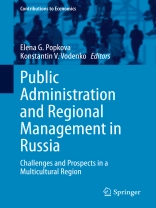This book addresses current challenges in public administration and regional management in Russia. By taking into account socio-economic factors, as well as key ethnic, cultural and social processes in multicultural regions, it identifies the prerequisites for successful public governance and regional management. The respective contributions cover a broad range of topics, including digitalization trends, managerial approaches, diversification strategies, and corporate cultures. Moreover, the book discusses the effects of ethnopolitical tensions and interethnic tolerance on public administration in Russia’s multicultural regions. Given its scope, the book offers a valuable resource for scholars and public servants at governmental institutions.
Tabela de Conteúdo
Introduction.- Part I. The Problems and Perspectives of Development of the System of Public Administration in the Modern Russian Conditions.- Developmental Trends in The Institutional Environment of Russian Civil Society Within the Context of Government Regulation of Socio-Economic Activities.- Imperatives of Diversification and Modernization of Public Policy in Modern Russia.- Global and Local Challenges and Threats to the Russian National System of Public Administration in Terms of The Global Financial Crisis.- The Strategy of Overcoming Path Dependence in the Context of Modernization of the Russian System of State Management.- Practices to Harmonize Cooperation Between Prevalent and Complementary Institutions of the Russian Society: Towards Institutional Balance and Administrative Expertise in the Public Area.- The Main Parameters of Functioning of Nationally-Oriented Capital in the Russian System of State Management.- Economic Federalism: Interaction of Federal Authorities and Regions.- City Management in the USА and Western Europe: Historical Background and Implementation Experience.- Administrative and Social Consistency of the City Management Institution.- Legal Irresponsibility as One of the Challenges to the Russian Society.-
Part II. The Leading Trends of Development of State Management of a Multicultural Region’s Economy.- Well-Balanced Development of Economy from the Positions of Various Interested Parties as a Criterion of Effectiveness of State Management of a Multicultural Region.- Globalization of a Multicultural Region: Possible Scenarios and Priorities of State Management.- Development of Economy of a Multicultural Region by the Circular Principles: Directions and Tools of State Management.- State Crisis Management of Economic: Specific Features of a Multicultural Region.- Innovative Development of a Multicultural Region’s Economy: Barriers and Perspectives.- Public-Private Partnership as a Perspective Mechanism of State Management of Development of a Multicultural Region’s Economy.- Government and Public Monitoring of Entrepreneurship in a Multicultural Region: New Perspectives in the Conditions of the Digital Economy.- Cluster Development of Economy of a Multicultural Region: Challenges for State Management.- Competitiveness of a Multicultural Region’s Economy: Measuring and Provision.- State Management of the Educational Services Market in a Multicultural Region as a Tool of Provision of Population’s High Living Standards.-
Part III. The Institutional Environment of Development of State Management in a Multicultural Region.- Unique Social Institutes of a Multicultural Region and Means of Their State Management.- Budget Limitations as a Barrier on the Path of State Management of Socio-Economic Development of a Multicultural Region.- Special Economic Areas in Multicultural Regions of Russia: Problems and Perspectives of State Management.- The Principles of State Management of Multicultural Region’s Economy and the Problems of Their Systemic Implementation.- The Optimal Ratio of State Management to Market Self-Administration in a Multicultural Region.- Algorithm of State Management of Modernization of a Multicultural Region’s Economy.- The Risk Model of State Management of Socio-Economic Development of a Multicultural Region.- State Management of Migration in a Multicultural Region: Current Problems and Their Solutions.- Social Justice in a Multicultural Region: Qualitative Treatment, Economic Measuring and State Management.- The Problem of Supporting High Flexibility of State Management of a Multicultural Region’s Economy and Its Solutions.-
Part IV. Education and Transformation of Russian Society as the Objects of Public Administration and Regional Management in Russia.- Developmental Strategies of Higher Professional Education Within External Challenges.- Management of Scientific and Educational Communities in Terms of Digitalization.- Specifics of Managerial Competenciesin the Context of Managing the Personnel of an Educational Organization.- Social and Investment Activities of University as a Subject of the Socio-Economic System in the Context of Provision of National Security.- Management Process of Students’ Professional Patriotism Formation in Multicultural Educational Environment.- Relationship of Corruption and Organized Crime Groups in the Russian Society.- Digitalization of Russian Society: Issues, Challenges and Prospects of Existence in a New Environment.- Cyber Crimes as a Threat to Digital Economy of the Russian Federation: Current State, Dynamic Pattern and Trends.- Sociological Analysis of Social and Psychological Resources of Russian Post-Penitentiary System through the Example of Multicultural Regions.- Socio-economic Potential of Protest Sentiment in the Stavropol Territory in the Context of the Process of Erosion of Fundamental Principles of Social Consensus.-
Part V. Problems and Perspectives of Regional Management in Russia in the Context of Provision of Multicultural Region’s Social Safety.- The Consequences of Modern Regional Policy in Russia.- The Place and Role of the Institution of Religion in the Current Context of Interethnic Interaction and Migration Policy in the South of Russia.- Interfaith Interactions in Multicultural Regions: Problems and Perspectives.- The Factors of Escalation of Ethno-Political Tension in the South of Russia- The Attitude of the Indigenous Population to External and Internal Migrants as the Indicator of Inter-Ethnic Tolerance.- Channels of Armenian Ethnic and National Identity Formation in Armenian Diaspora on the Don.- Mental Programs and Models of Medical Care Consumption in a Multicultural Region of the South of Russia.- Trans-Conflict Region in the Context of Theory of Securitization: the Problems of Management.- Assessment of Corporate Management Performance at Modern Enterprises.- The Problems of Legal Regulation of Economic Security in the Context of Development ofthe Digital Economy.- Conclusions.
Sobre o autor
Elena G. Popkova is a Professor and leading researcher at the Department of Management Theories and Business Technologies, Plekhanov Russian University of Economics, Moscow, Russia. Her scientific interests include economic growth, sustainable development, globalization, humanization of economic growth, developing countries, institutionalization of social development, development planning, and strategic planning. She is a Guest Editor for the Asian Social Science Journal and a member of the editorial board for the International Research Journal of Marketing, Journal of Macroeconomic Dynamics Research, and International Journal of Economic Policy in Emerging Countries. She has authored numerous articles in national and international peer-reviewed journals.
Konstantin V. Vodenko is a Professor at Platov South Russian State Polytechnic University, Novocherkassk, Russia. His scientific interests include socio-cultural and socio-economic institutions and public administration. He is Deputy Editor-in-Chief of the journal Humanitarian of South Russia. He has more than 200 publications, including 20 articles indexed in Scopus and Web of Science, to his credit. He served as a Guest Editor of the special issue “Vectors & Narrative Discourses of Modern Society” in the Pertanika Journal of Social Sciences & Humanities.












